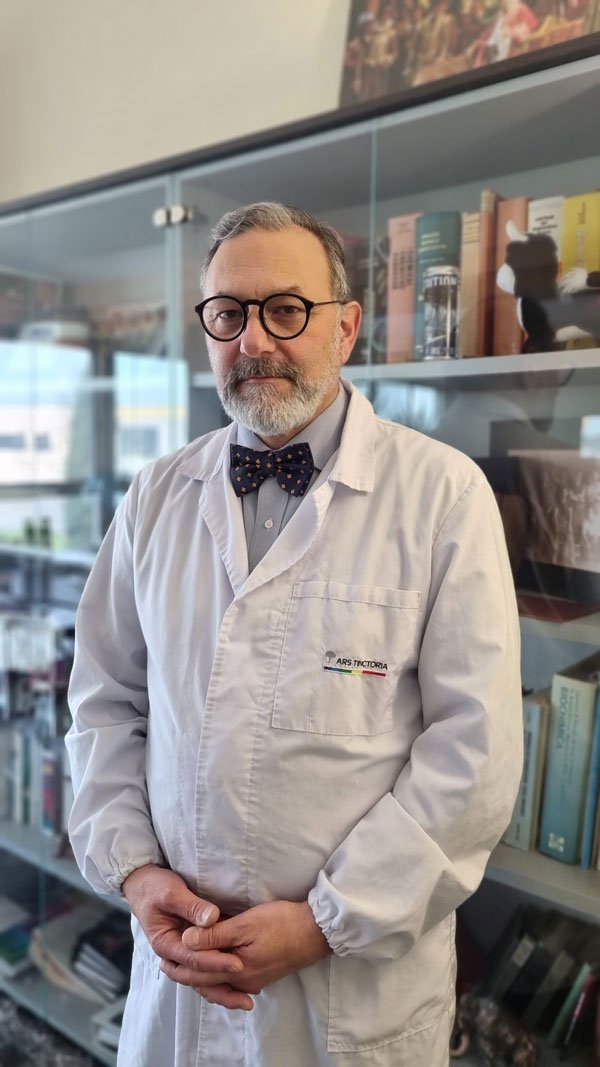Since its foundation, Ars Tinctoria had as main scope the research of materials and their dyes and pigments. Founded in 2011, the first five years’ activity of the laboratory was devoted to dyes analytics for REACh registration, covering hundreds of molecules of colouring substances for Leather, Textile, Paper and Plastic industries. Born in a leather industry context, since its foundation the laboratory supports the evolution of tanneries in their environmental impact reduction.
Being conscious that apparel and accessories sectors need not only Leather but environmentally friendly textiles and chemicals, the laboratory supported materials industries with new technical solutions.
Since September 2022 Ars Tinctoria became one of the few laboratories worldwide specialised on radiocarbon analysis of fashion materials operating its own analytical facilities.
Ars Tinctoria is proud to share the fruits of its Radiocarbon analysis of Leather and alternative materials.
“Materials’ Circularity: A Novel Method for Biobased Carbon Quantification on Leather, Artificial Leather, and Trendy Alternatives” is a report resulting from the collaboration of Ars Tinctoria with CNR-INO (National Institute of Optics- Florence), LENS (European Laboratory of Non-Linear Spectroscopy – Sesto Fiorentino), University of Florence and ppqSense (a spinoff of CNR-INO) and Federico Carcione, Iacopo Galli, Saverio Bartalini and Davide Mazzotti, renown as researchers in the Physics field. Gustavo Adrián Defeo coordinated and supported the project with his expertise on materials.
This research on radiocarbon analysis was started by Ars Tinctoria during 2018 while they were studying the latest European regulatory trends on circularity and sustainability in a Green Deal policy context. The concept of Bioeconomy proposed by Europe justifies the need to evolve towards a new analytical point of view. Unfortunately, the widespread practice of greenwashing under false sustainability credentials was worsening the environmental impact of industries in general, inducing tanneries to more polluting processes and new startups to promote alternatives to leather without considering the real environmental consequences on the end of life of such new materials.
After the long waiting times needed to perform the first trials with official institutions operating AMS (Accelerator Mass Spectrometry) and LSC (Liquid Scintillation Counting), worsened by the lockdown period during the Covid 19 pandemic, in 2020 Gustavo Defeo, who was in contact with Prof. Saverio Bartalini from CNR-INO and his colleagues working in the spinoff ppqSense, supported with great enthusiasm the research.
The paper has an introduction which sites the latest environmental policies to achieve carbon neutrality in an attempt to contain global warming, and the proliferation of alternative materials promising sustainability goals with inadequate scientific support.
The paper continues with an explanation of SCAR (Saturated-absorption CAvity Ring-down) spectroscopy principles and the analytical method developed by the authors for miscellaneous materials, and the validation against AMS spectrometry on samples covering approximately the 0 – 100 pMC (parts of Modern Carbon) range, describing in detail the repeatability of the measurements done. It is important to point out that the tests shown in this paper represent all measurements done for the validation, without repeating or omitting them showing the robustness of the system, perfectly aligned to AMS measurements results.
As a conclusion of this paper, results have been disclosed; they were obtained on the Biobased Carbon content of the materials included in Meyer et Al. article, as well as other Leather samples ranging from heavily coated to nubuck, splits, salmon skins, with miscellaneous tanning methods (metal free, Chrome and pure vegetable).

Gustavo Adrian Defeo

Spettrometro SCAR: from the left: Dr. Alessio Montori (CNR–INO / PPQ Sense), Dr. Federico Carcione (Univ. Florence), Dr. Amelia Detti (PPQ–Sense), Prof Saverio Bartalini (CNR–INO / PPQ Sense), e Gustavo Defeo FSLTC.
